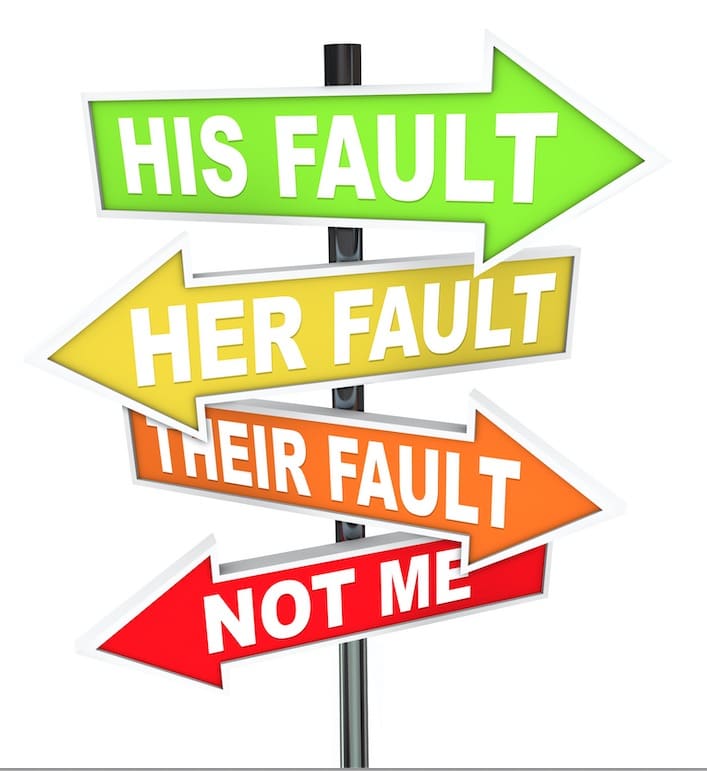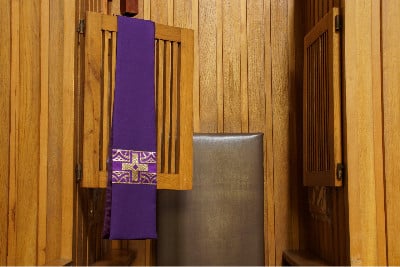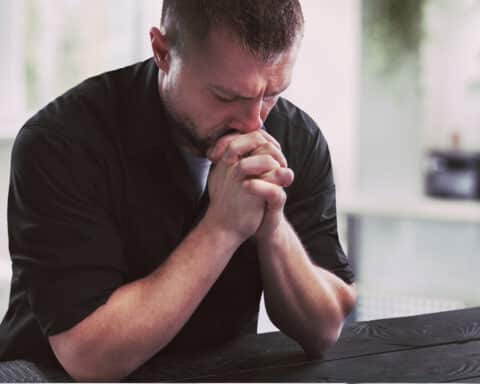“Not my fault, not my fault, not even a little bit my fault.”
At times, that seems to be our default setting. But, hey, we can blame it on our parents. After all, that’s what Scripture says.
Mama Eve and Papa Adam. All creation was hunky-dory until … well, you know the story. Picked the fruit from that one tree — the one tree in the whole wide world God had warned them about: “Keep your mitts off it.”
So … in Eden it was temptation/sample/share. Ah, but Papa blames Mama, Mama blames Snakey and, to use a very, very loose summary and translation: “They ate the fruit and got the boot.”
And here we are. Here you are. An innocent victim of original sin. But, of course, this story — this truth, this divine revelation — doesn’t end there.
You know that: Jesus, crucifixion, redemption.
 Can’t blame Papa or Mama or Snakey. Well, Snakey still has a hand in it … so to speak. Still has his eye on you. Always there not just to tempt you with a veritable forbidden fruit basket, but delighted to give you the insight, the angle, the baloney, to convince you if that was a sin — a big “if” — you’re still not at fault because ….
Can’t blame Papa or Mama or Snakey. Well, Snakey still has a hand in it … so to speak. Still has his eye on you. Always there not just to tempt you with a veritable forbidden fruit basket, but delighted to give you the insight, the angle, the baloney, to convince you if that was a sin — a big “if” — you’re still not at fault because ….
Better still, he suggests the words to use in your own defense. Words to say to yourself or others or both, as needed. “The buck stops here” morphs into, “The excuse starts here.”
But God, dear God, loves us so much (“infinitely” is really quite a large amount), we can accept his forgiveness and grace so that our self-defense … rests. And with that, we can learn to live in the world of mea culpa. Latin for “my bad.”
But — another “but” — receiving God’s forgiveness and grace can seem a bit like being handed a piece of furniture from Ikea. A box with many parts, large and small, and work to do, instructions to follow.
Beyond those directions, or with them, God also gives us some spiritual help lines for when we’re stuck or confused or frustrated or discouraged. Lines that he always tosses our way when we ask for help. You know them but maybe haven’t thought of them in that way too often. Holy Spirit, sacraments, Scripture, Church, Communion of Saints and on and on.
So! With all that in mind (and heart and soul), here are a few points to consider:
1. There’s no substitute for humility
And as luck would have it — well, not “luck” — as God would have it, the virtue of humility is yours for the asking. For the living.
Humility is a list-topper, because admitting a fault, an error, a sin, can really chip away at that carefully constructed false idol named “Pride.” Not a healthy, holy pride. But a me-me-me pride that inflates us until we resemble the Ghostbusters’ Stay-Puft Marshmallow Man.
And the truth — that is, the cold, hard, reality — is that you ain’t all that, because no human (except Jesus and Mary) is all that.
You know this. We all know this. And each and every one of us needs to be reminded. Sometimes with a semi-gentle kick in the pants. Sometimes admitting our fault, or others calling us on it (“fraternal correction” can be a tough pill to swallow). No matter the source, that reality check (or recheck) is like a hatpin jabbed right into our puffy exterior, our prideful interior. Not causing an explosion but the hisssss of our egos deflating. And perhaps of Snakey muttering to himself as he slithers away. For now.
Then, too, it’s very clear Jesus was, and is, very pro-humility.
“Take my yoke upon you and learn from me, for I am meek and humble of heart; and you will find rest for yourselves. For my yoke is easy, and my burden light” (Mt 11:29-30).
Life is easier if we carry his yoke, not one of our own making — one of pride coated with a shiny pretense of perfection.
That’s a tough, tough way to live.
2. A courageous act
Freely admitting the truth of your goofing up (or worse) takes courage. We all much prefer to follow the advice offered to grade-schoolers in the Cold War era. Worried about nuclear annihilation? “Duck and cover.” Yes, that will solve everything. But, of course, it wouldn’t then, and it doesn’t now when it comes to blame.
Why not now? Because, so often, not admitting it’s our fault puts the bull’s-eye on someone else. And here’s a little motivator: Consider how absolutely honked off you are when you’re blamed for something someone else did. (Someone now doing an Oscar-worthy job of looking wide-eyed and innocent.)
“Do unto others as …” Remember? (Check out Matthew 7:12.) One facet of that is stepping up and speaking out.
And that can be scary! That can have consequences, big or small. You wouldn’t need courage if scary consequences didn’t loom. But they do. So you do.
Fortunately (a little good news here), both the virtues of humility and courage get stronger the more we use them. They get easier. As do all virtues. (Flip side/bad news: ditto for vices.)
3. God is one smart cookie
Scripture teaches us this … just using other words. Like a virtue-enhancing multivitamin, God gives us a single way to punch up both our humility and our courage.

And that is, uh oh, the Sacrament of Reconciliation. More commonly known as penance or confession. An honest examination of conscience can’t happen without humility. And walking — what can feel like “the Church aisle green mile” — the few steps into a confessional can take courage. Telling a priest what you have done and what you have failed to do. No excuses. Yes, he’s there in persona Christi — in the person of Christ — but still. Still!
Perhaps this can help. That “smart cookie” (or is it “Smart Cookie”?) already knows what you’re going to say. But, it seems safe to speculate, openly admitting your faults and asking for his forgiveness is one of the ways “God takes delight in you” (Zeph 3:17, as some translations put it).
You make that Abba, that Daddy, so happy, he’s tickled pink.
In a good way, that’s your fault. That’s your doing. And, as the master in the parable of the talents says: “Well done!”
Bill Dodds writes from Washington.
| Pope Benedict XVI on frequent confession |
|---|
|
On Oct. 15, 2005, Pope Benedict XVI met with children who had recently received their first Communion. One child asked the pope if she needed to go to confession before each reception of the Eucharist. Here, in part, is the pope’s answer: “Even if … it is not necessary to go to confession before each Communion, it is very helpful to confess with a certain regularity. It is true: Our sins are always the same, but we clean our homes, our rooms, at least once a week, even if the dirt is always the same; in order to live in cleanliness, in order to start again. Otherwise, the dirt might not be seen, but it builds up. Something similar can be said about the soul, for me, myself: If I never go to confession, my soul is neglected, and in the end, I am always pleased with myself and no longer understand that I must always work hard to improve, that I must make progress. And this cleansing of the soul, which Jesus gives us in the Sacrament of Confession, helps us to make our consciences more alert, more open, and hence, it also helps us to mature spiritually and as human persons. Therefore, two things: Confession is only necessary in the case of a serious sin, but it is very helpful to confess regularly in order to foster the cleanliness and beauty of the soul and to mature day by day in life.” |





